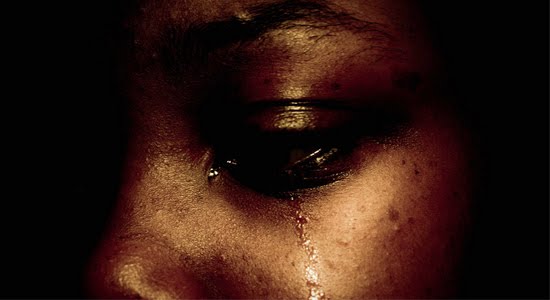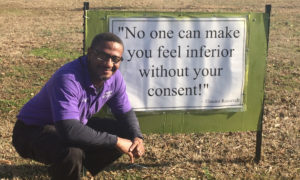News
#USTOO

In the midst of the Harvey Weinstein travesty, let’s not forget government stats show Black women are dying in record numbers from domestic violence.
Shanikia Johnson. Ashanti Hunter. Rena Marie Hodges. Rose Blake.
You may not know their names, but they were mothers, daughters, friends and their lives mattered.
Johnson’s first weeks of bonding with her newborn son were abruptly interrupted earlier this month; she’d called Houston Police on Friday, October 6 to report that her boyfriend, the two-week old baby’s father, 35-year-old Robert Graves, had beaten her up. He was arrested and jailed. By the following Wednesday, Johnson was dead . Investigators say Graves showed up at her apartment shortly after being released on an unsecured bond. She let him in. Her sister says three days later, Graves claimed he’d found Johnson, a well-liked reading specialist at an elementary school, unresponsive. She later died. Her family questions why he was ever let out of jail.
Hunter, a 32-year-old mother of three, also from the Houston area, had been dating Albee Lewis for five years. They shared a child together. Investigators say on April 30, an argument between them escalated into a physical fight. Hunter sprinted from their apartment, attempting to take cover inside her cousin’s white SUV parked outside. Her children and their young cousins literally ran “out of their shoes” fleeing behind her, according to investigators. Witnesses say Lewis shot Hunter dead through the vehicle’s window, killing her in the passenger seat. Her 11-year-old was just a few feet away. Family members said they weren’t aware of any problems between the couple.
On February 16 , Hodges, also a mother of three, had reportedly called a friend saying that she and her common-law husband Jerald Dewayne Watt, a Houston rapper known as “CDK,” were fighting and she wanted him to leave their townhome. The two had previously danced alongside each other “Beyoncé-and-Jay-Z-style” in several of his music videos posted on YouTube ; Hodges often singing the hook on his raps.
In some scenes, they’d even posed playfully with pistols. Family members say they found Hodges with a gunshot wound to the head inside her home after she failed to pick up her kids from a babysitter. She was 35.
Also in February, 38-year-old Rose Blake’s life ended in unimaginable horror . Police says her 11-year-old son could be heard on a 911 call, literally begging his father, Medger Blake, to stop stabbing his mother to death inside the master bedroom of their home. The boy barricaded himself inside a bathroom until sheriff’s deputies arrived. Medgar was shot dead by responding officers, who claim he’d lunged at them with a knife. He reportedly left a detailed note, apologizing to his family.
All of these deadly domestic violence incidents, also known as intimate partner violence (IPV), may have occurred in Texas, but it’s a global public health and social justice issue. As we wrap up National Domestic Violence Awareness Month this October, it’s imperative that we remember these women – all women of color – whose stories illuminate a disheartening reality: that women in the United States are more likely than any other group in the world to be killed by an intimate partner, according to Centers for Disease Control and Prevention (CDC) statistics.
A CDC report released in July , however, also reveals a lesser-known and equally disheartening trend that is chronically underreported. Young women of color are more likely than any other group of women to be killed by their husbands and boyfriends. For example, black women, the CDC’s analysis indicated, are killed at a rate of 4.4 per 100,000 people and indigenous women at a rate of 4.3 per 100,000. Every other race ranked between 1 and 2 per 100,000. Reports also show black and indigenous women experience rape and other forms of sexual or physical violence at alarmingly high rates as well.
A CDC National Intimate Partner and Sexual Violence Survey found that approximately 22 percent of black women and 26.9 percent of American Indian or Alaska Native women, have been raped at some point in their life. Black and indigenous women reportedly experience rape, stalking, and/or physical violence at rates 30 to 50 percent higher than those experienced by Hispanic, non-Hispanic white, or Asian or Pacific Islander women.
In 2009, a report from the Bureau of Justice Statistics found that in 2007 black women killed in intimate partner homicides were twice as likely to have been murdered by a spouse and four times as likely to have been killed by a boyfriend or girlfriend than white women. So, while most crime coverage implies that strangers pose the biggest threat, whom women choose to date, marry and procreate with actually impacts their safety most.
The recent controversy currently swirling around Hollywood producer Harvey Weinstein has provided women of all colors, creeds and backgrounds with a rare but critical opportunity to speak up and speak out about the prevalence of sexual assault and sexual harassment deeply embedded in American culture. However, let’s not miss out on this chance to illuminate – and no longer ignore – the exceptional burden that statistics confirm that we, as black women and women of color, face as it relates to bearing a disproportionate level of violence and abuse at the hands of the very men whom we love and trust. We don’t know what all led up to the untimely deaths of Shanikia, Ashanti, Rena and Rose, but we must all agree, however, that what happened to them, should not have. Nor should we continue to accept domestic violence as “a black thing.”

-

 Featured10 months ago
Featured10 months agoCalifornia Is the First State to Create A Public Alert for Missing Black Youth
-

 Featured9 months ago
Featured9 months agoAfrican American Leaders Stay the Course Amid Calls for President Biden To Bow Out of Race
-

 Featured10 months ago
Featured10 months agoThe Debate Fallout Lands on Both Candidates
-

 Featured9 months ago
Featured9 months agoPresident Joe Biden Decides to Withdraw from the Presidential Race
-

 Featured9 months ago
Featured9 months agoIn One of His Final Speeches as President, Biden Says It’s Time for ‘Fresh Voices’
-

 Featured9 months ago
Featured9 months agoPresident Joe Biden Describes Shooting of Donald Trump As ‘Sick’









